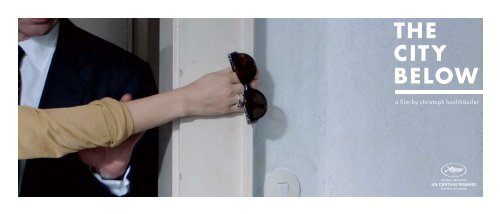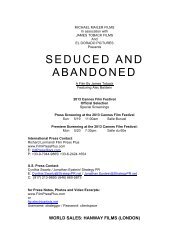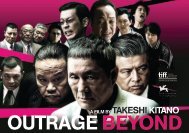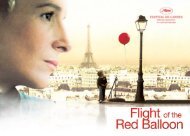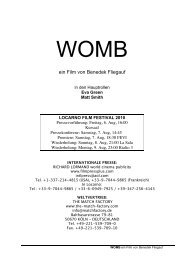You also want an ePaper? Increase the reach of your titles
YUMPU automatically turns print PDFs into web optimized ePapers that Google loves.
<strong>the</strong><br />
<strong>city</strong><br />
<strong>below</strong><br />
a <strong>film</strong> by christoph hochhäusler
synopsis<br />
A man and a woman at an art exhibition share a fleeting moment of attraction, which<br />
nei<strong>the</strong>r can act upon. Days later, a chance second meeting leads to an innocent<br />
coffee and <strong>the</strong> two strangers – both married – toy with <strong>the</strong>ir unexplainable fascination<br />
for each o<strong>the</strong>r. Svenja is curious and finds herself in a hotel room with Roland, but<br />
she does not consummate an affair. A powerful executive at <strong>the</strong> large bank where<br />
Svenja’s husband works, Roland is used to getting what he wants. He manipulates <strong>the</strong><br />
transfer of her husband to Indonesia to replace a recently murdered bank manager.<br />
Unaware of Roland’s actions, Svenja now ceases to resist… From <strong>the</strong> director of<br />
I AM GUILTY aka LOW PROFILE (FALSCHER BEKENNER) and THIS VERY MOMENT<br />
(MILCHWALD).
comments from christoph hochhäusler<br />
unexplainable attraction When Roland’s wife eventually confronts him about his<br />
affair, he says: “I have no name for it.” We all consider ourselves rational animals,<br />
but we are not, actually. Not <strong>the</strong> slightest bit. Love might be a deal, but attraction is<br />
primal. You meet someone, anyone, and instantly you know you could love or hate him<br />
or her. The first thing we know is feeling. That’s dangerous, but despite what we believe,<br />
all <strong>the</strong> logic in <strong>the</strong> world can’t protect us from animal instinct. For me, cinema is all about<br />
this kind of danger.<br />
longing for <strong>the</strong> opposite Svenja and Roland are not on <strong>the</strong> same social level,<br />
and <strong>the</strong>y never will be. He’s part of corporate aristocracy, and he married into old<br />
money for a reason. His whole life is dedicated to <strong>the</strong> game and its rules. He loves<br />
deals and deals love him. Svenja’s game is life. She could not care less for <strong>the</strong> game<br />
of big finance. There is this famous phrase by artist Maurizio Nannucci: “You can<br />
imagine <strong>the</strong> opposite.” For me, it means that <strong>the</strong> opposite follows us, like a shadow, like<br />
a nihilistic desire to break up with <strong>the</strong> comfort we have surrounded us with. We want to<br />
get real, to wake up. It’s a confrontational thing. We have <strong>the</strong> hope to be awakened by<br />
someone, an opposite force. One longs for <strong>the</strong> opposite. This is perhaps <strong>the</strong> heart of <strong>the</strong><br />
<strong>film</strong>. It’s really about losing touch with reality, and about <strong>the</strong> counter reaction, attaining<br />
reality in love, in <strong>the</strong> body.<br />
svenja I have always seen Svenja as someone coming from a floating, unsteady<br />
life. Someone for whom it is difficult to say no. Not out of weakness, she is just open,<br />
curious to see what will happen next. Unlike her husband Oliver, who is driven by an<br />
image, an idea of a life he wants to achieve. But what’s fascinating is how Svenja<br />
manages to confuse Roland’s – and our – imagination again and again. Svenja is no<br />
victim, no puppet on a string.<br />
roland Roland can shape <strong>the</strong> world to suit his will, at least for some time. He is well<br />
aware of his attraction to Svenja and he plays with it right from <strong>the</strong> start. But he will<br />
be taken by surprise that <strong>the</strong> affair actually matters to him. What comes as a surprise,<br />
or more precise: as an accident, is <strong>the</strong> momentum, <strong>the</strong> gravity of his feelings.<br />
a challenge and a mirror Svenja is Roland’s equal. The only reason she is interesting<br />
for him. As a challenge and as a mirror. They resemble each o<strong>the</strong>r in <strong>the</strong>ir deep<br />
sense of loss. They both have no firm ground beneath <strong>the</strong>ir feet. Something binds <strong>the</strong>m,<br />
but I don’t think <strong>the</strong>se two will grow old toge<strong>the</strong>r.
how power affects love The <strong>film</strong> is inspired by <strong>the</strong> biblical story of David and<br />
Bathsheba in its basic outline, but with a capitalist aspect. That was <strong>the</strong> basic idea<br />
that I presented to my co-screenwriter Ulrich Peltzer. Someone uses his power for his<br />
love and at <strong>the</strong> same time destroys his love with it. It was just material for us. Many<br />
o<strong>the</strong>r things were added. This is what I found interesting: How power affects <strong>the</strong> longing<br />
for what we call love. Power transcends (or corrupts) ideology, beliefs, bonds. Power<br />
is all about action. Not unlike children destroying sand castles, <strong>the</strong> powerful love<br />
nothing more than <strong>the</strong> proof of <strong>the</strong>ir force.<br />
<strong>the</strong> banking world During our screenplay research, we read books and articles<br />
on <strong>the</strong> banking world – and this was long before <strong>the</strong> crisis – partly tell-all books, but<br />
also a few basics. Then through friends and acquaintances, we met and interviewed<br />
middle and executive bankers, all <strong>the</strong> way up to <strong>the</strong> CEO. It was very exciting to penetrate<br />
and delve into this world. The biggest surprise was to see how irrationally this<br />
“cutting edge of capitalism” functions, how unpredictable it is also for those who are<br />
allegedly steering it. The crisis finally seemed almost logical… in terms of a correction<br />
of an unreliable narrative, a world of numbers that simply couldn’t care less for reality.<br />
Because feedback from <strong>the</strong> factual world is less direct, an incorrect assessment may take<br />
years to have an impact. By <strong>the</strong>n, those responsible have long since moved on to o<strong>the</strong>r<br />
companies.<br />
fierce competitiveness “Résumés!” says Roland at one point and means it contemptuously.<br />
The question of what résumés mean gradually developed into a leitmotif.<br />
At one point, a board member says that Oliver’s CV is AAA+. That’s what it’s all<br />
about: everything is rated and evaluated… Fierce competitiveness applies to every<br />
large company, but it’s perhaps more extreme in <strong>the</strong> banking sector because it’s<br />
strictly about money, especially in investment banking. Because everyone is working<br />
against everyone else, also within <strong>the</strong>ir own companies, departments can be systematically<br />
provided with one-sided reports, and <strong>the</strong> result is an unreliable narrative. These<br />
are <strong>the</strong> so-called “meeting report wars”. Competition as a narrative system does not promote<br />
<strong>the</strong> truth, but ra<strong>the</strong>r many stories with happy endings, in any case from <strong>the</strong> perspective<br />
of <strong>the</strong> respective author. If you project this distortion onto <strong>the</strong> overall market, and<br />
given that accountants and rating agencies fail as correctives because <strong>the</strong>y are hopelessly<br />
dependent on <strong>the</strong> firms <strong>the</strong>y are supposed to evaluate, one can imagine very well<br />
how <strong>the</strong> crisis emerged.<br />
frankfurt Frankfurt, where <strong>the</strong> story is set, also plays a role in <strong>the</strong> <strong>film</strong>. I know <strong>the</strong><br />
<strong>city</strong> very well, but I have never lived <strong>the</strong>re. I’m not a native and I don’t want to sound<br />
that way when I describe a place. The only <strong>city</strong> that I could speak about as a native<br />
is Munich. I’ve been living in Berlin for 10 years and I know a lot about its history,<br />
etc., but when you grow up in a <strong>city</strong> you naturally get more intimate perspectives.<br />
Never<strong>the</strong>less, <strong>the</strong>re’s a lot in <strong>the</strong> <strong>film</strong> that is typical of Frankfurt: money, art, drugs…<br />
Frankfurt is Germany’s banking center, and as a banking location <strong>the</strong> number two in
Europe. And it’s a “global <strong>city</strong>”, a place just big enough that anything could happen<br />
<strong>the</strong>re. Like our story. What I like about this town is contrast. It’s both very small and<br />
very international, it’s grounded in <strong>the</strong> tradition of Hesse, but tries so hard to be an<br />
American <strong>city</strong>. In many ways, what makes it modern is that it is a fantasy, a simulation.<br />
art and culture in frankfurt There is a lot of money in this town – which is why<br />
<strong>the</strong>re are a lot of fine art museums and galleries. Culture seems to be not <strong>the</strong> antidote,<br />
but <strong>the</strong> cover for big business <strong>the</strong>re. The banks want to show off <strong>the</strong>ir wealth. At<br />
Deutsche Bank, <strong>the</strong> heavyweight player of German banking, every floor has it’s distinct<br />
art program – <strong>the</strong> higher you go, <strong>the</strong> more expensive <strong>the</strong> art works. You can tell<br />
by <strong>the</strong> artist in your office <strong>the</strong> level you have reached, career-wise. In Roland’s office<br />
in <strong>the</strong> <strong>film</strong>, we see works by German artist Gün<strong>the</strong>r Förg – <strong>the</strong> market prices for <strong>the</strong>se<br />
paintings equal our production budget. We were able to borrow <strong>the</strong>m thanks to <strong>the</strong><br />
generous support of <strong>the</strong> artist. Rolf Breuer, former CEO of Deutsche Bank, had Förg<br />
works in his office, too. We tried to be realistic and searched for a mix that is fitting for<br />
that world, not one that caters to my personal taste. And all <strong>the</strong> works of art seen in <strong>the</strong><br />
<strong>film</strong> are originals.<br />
a life in glass cases The banking world in <strong>the</strong> <strong>film</strong> is basically living and working<br />
in glass cases. Transparency always sounds so promising, but in effect, it often only<br />
means control. In a glass building, you can no longer hide a short well-deserved<br />
office nap. And this control is what triggers <strong>the</strong> longing for a greedy, dirty life. Today<br />
in everyday life, glass surrounds us. In <strong>the</strong> past, under <strong>the</strong> table was an off-limits<br />
area, a realm of freedom. But with so many glass tables <strong>the</strong>se days, I have to watch<br />
out that I’m not wearing <strong>the</strong> wrong socks. A major <strong>the</strong>me both in photography and<br />
production design was “reflection”, which in practical terms means glass. Glass creates<br />
an illusionary effect – because <strong>the</strong> world seems close, but it is out of reach, out of<br />
touch. The way we create “reality” in our minds is closely connected with <strong>the</strong><br />
activity of our hands. We verify with hands. Production designer Tim Pannen gave<br />
Roland’s office an even more unreal feeling by using white carpets. They create this<br />
weightless feeling when you look down on <strong>the</strong> <strong>city</strong> from <strong>the</strong> 27th floor.<br />
<strong>the</strong> crisis will eventually arrive on <strong>the</strong> streets One of <strong>the</strong> reasons investment<br />
bankers think of <strong>the</strong>mselves so highly (and so lowly of o<strong>the</strong>rs) lies in <strong>the</strong> fact that competition<br />
is so fierce that battlefield analogies are somewhat justified. They are warriors, or,<br />
to be more precise, merceneries, fully aware of <strong>the</strong> fact that <strong>the</strong>ir actions can kill<br />
bonds, companies, countries and what not. What is disturbing are <strong>the</strong> increasing repercussions<br />
on everyday life. A phrase that played a role for <strong>the</strong> <strong>film</strong>’s ending was:<br />
The crisis will eventually arrive on <strong>the</strong> streets. This is both a threat and a hope. What is<br />
happening does matter, and things have consequences, that no one can permanently<br />
escape.
iographies<br />
christoph hochhäusler Born 1972 in Munich, Germany. Studied architecture at<br />
TU, Berlin and <strong>film</strong> direction at HFF, Munich. He is also founder and co-publisher of<br />
<strong>the</strong> <strong>film</strong> magazine Revolver. His <strong>film</strong>s include: FEVER (FIEBER, Short Movie 1999), THIS<br />
VERY MOMENT (MILCHWALD, 2003), LOW PROFILE (FALSCHER BEKENNER, 2005),<br />
SÉANCE (Segment of DEUTSCHLAND 09, 2009), THE CITY BELOW (UNTER DIR DIE<br />
STADT, 2010)<br />
nicolette krebitz Born in Berlin in 1972, has been in front of <strong>the</strong> camera since 1982.<br />
Since <strong>the</strong>n she has performed in various productions for <strong>film</strong>, TV and <strong>the</strong>ater, had her<br />
own band, and composed toge<strong>the</strong>r with her colleages <strong>the</strong> soundtrack to <strong>the</strong> road movie<br />
BANDITS. At <strong>the</strong> age of 23 she received her second Adolf Grimme Award, as well as a<br />
Golden Record (1998) and <strong>the</strong> Bavarian Film Award (for Best Music). In 2004 she received<br />
her second Golden Camera award for her performance in Vivian Naefe’s feature<br />
SO SCHNELL DU KANNST.<br />
Apart from her work as an actress Nicolette Krebitz has produced and directed her own<br />
<strong>film</strong>s since 2001, such as JEANS and THE HEART IS A DARK FOREST. Her short<strong>film</strong> THE<br />
UNFINISHED (DIE UNVOLLENDETE) was part of <strong>the</strong> short<strong>film</strong> compilation GERMANY 09<br />
that premiered at <strong>the</strong> Berlinale 2009.<br />
Filmography (Selection)<br />
2010 THE CITY BELOW (UNTER DIR DIE STADT) by Christoph Hochhäusler<br />
2008 LIEBESLIED by Anne Høegh Krohn<br />
2003 ZWISCHEN TAG UND NACHT by Nicolai Rohde<br />
2002 SO SCHNELL DU KANNST by Vivian Naefe<br />
2000 THE TUNNEL by Roland Suzo Richter<br />
1996 BANDITS by Katja von Garnier<br />
1994 AUSGERECHNET ZOÉ by Markus Imboden<br />
robert hunger-bühler After attending <strong>the</strong> Schauspielakademie Zürich and completing<br />
Theater and Philosophy studies in Vienna, Hunger-Bühler worked as an actor<br />
and director in Vienna, Bonn, Düsseldorf and Freiburg. He also worked at <strong>the</strong> Freie<br />
Volksbühne Berlin, <strong>the</strong> Volksbühne am Rosa-Luxemburg-Platz, <strong>the</strong> Berliner Ensemble<br />
and <strong>the</strong> Burg<strong>the</strong>ater Wien.<br />
He worked with several directors including Jossi Wieler, Jürgen Kruse, Frank Castorf,<br />
Andrea Breth, Claus Peymann, Luc Bondy, Barbara Frey, Stefan Pucher, Johan Simons,<br />
Klaus Michael Grüber, Peter Zadek and Christoph Marthaler. In Peter Stein’s legendary<br />
production of “Faust”, Hunger-Bühler played <strong>the</strong> role of Mephisto<br />
He has played in various <strong>film</strong> and TV productions, a selection includes: GIER (Dieter<br />
Wedel), CASANOVA (Richard Blank), DANNI (Martin Gies), TATORT (TV), POLIZEIRUF<br />
(TV), DER REDENSCHREIBER (Julia Albrecht, Busso von Müller), BINGO (Markus<br />
Imboden).<br />
Since <strong>the</strong> 2001/02 season, Robert has been a member of <strong>the</strong> ensemble at <strong>the</strong> Schauspielhaus<br />
Zürich. Since 2001, he is also a member of <strong>the</strong> Akademie für Darstellende<br />
Künste Berlin.
cast&crew<br />
svenja steve Nicolette Krebitz<br />
roland cordes Robert Hunger-Bühler<br />
oliver steve Mark Waschke<br />
claudia cordes Corinna Kirchhoff<br />
andrew lau Van-Lam Vissay<br />
werner löbau Wolfgang Böck<br />
hermann josef esch Paul Faßnacht<br />
uwe maas Oliver Broumis<br />
frank kressnick Robert Schupp<br />
stefan scharf André Dietz<br />
hartmut john Michael Abendroth<br />
gordon parker Johannes Kiebranz<br />
markus de hadlen Klaus Zmorek<br />
britta lau Alexandra Finder<br />
dr. silbereisen Alexandra von Schwerin<br />
marianne suhren Heike Trinker<br />
annika lebert Angelika Bartsch<br />
jens janssen Piet Fuchs<br />
director Christoph Hochhäusler<br />
screenplay Ulrich Peltzer, Christoph Hochhäusler<br />
dop Bernhard Keller<br />
editor Stephan Stabenow<br />
production design Tim Pannen<br />
costume design Birgitt Kilian<br />
casting Ulrike Müller<br />
make-up Astrid Weber<br />
sound recordist Michael Busch<br />
music Benedikt Schiefer<br />
sounddesign Rainer Heesch<br />
sound mix Matthias Lempert<br />
postproduction supervisor Niko Remus<br />
production manager Rüdiger Jordan<br />
line producer Sascha Verhey<br />
producer Bettina Brokemper<br />
technical data 35 mm / 1:2,35 / 110 mins<br />
Dolby Digital SRD / Colour<br />
German with English subtitles<br />
a production of Heimat<strong>film</strong> GmbH + Co. KG<br />
in co-production with WDR-Arte<br />
with support from Filmstiftung NRW,<br />
Hessen Invest Film, Deutscher Filmförderfonds
international <strong>press</strong> / richard lormand<br />
world cinema publi<strong>city</strong><br />
www.<strong>film</strong><strong>press</strong><strong>plus</strong>.com<br />
E-Mail: intl<strong>press</strong>@aol.com<br />
Tel: +33-9-7044-9865 / +33-6-2424-1654<br />
french <strong>press</strong> / viviana andriani<br />
rendez-vous<br />
E-Mail: viviana@rv-<strong>press</strong>.com<br />
Tel: +33-1-4266-3635<br />
In Cannes / Cell: +33-6-8016-8139<br />
german <strong>press</strong> / arne höhne<br />
höhne <strong>press</strong>e<br />
www.hoehne<strong>press</strong>e.de<br />
E-Mail: hoehne@pifflmedien.de<br />
Tel: +49-177-6242-401<br />
international sales supported by<br />
world sales / <strong>the</strong> match factory<br />
Balthasarstrasse 79–81<br />
50670 Cologne / Germany<br />
www.<strong>the</strong>-match-factory.com<br />
E-Mail: info@matchfactory.de<br />
Tel: +49-221-5397-09-0<br />
Fax: +49-221-5397-09-10<br />
In Cannes (12–23 May 2010)<br />
Résidence “La Bagatelle” / 4th Floor<br />
25 Boulevard de la Croisette<br />
06400 Cannes<br />
Tel: +33-49-7065-689<br />
Fax: +33-49-7065-684


